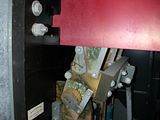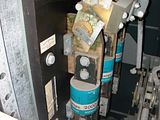Missed that in the title, still test them with DLRO and compare to manufactures values
Great stuff here, thanks everyone. Here's what I'm hearing (for my application):
* Bolted pressure switches, if not regularly maintained, have a 50-50 chance of getting stuck.
* Hence, an argument for not testing unmaintained switches: If there was ever an overcurrent event the fuses would go, and the BPS-being-stuck issue would become known at that time. Why force the replacement of half the switches when there is something like a 95% likelihood none of the district's BPS's will ever need opened? Being proactive (so the argument goes) is unnecessary and costly, so be passive and provide clear warning labels that state switches have not been maintained and may not open.
* I presume the argument FOR testing them would be if you have bad switches, you should be proactive and find them before someone gets hurt. Tell the Owner if he proceeds this way to budget replacing half his switches.
* If you do test: Call out for visual inspection and confirmation of mechanical operation. Test (contacts?) using DLRO and compare to manufacturer's values. Don't lube anything as mixing/misapplying the wrong lubricants could cause more harm than good.
* I assume that testing for standard fusible switches (non-BPS) should be same as for BPS.
As far as recommended maintenance - assuming the BPS's are fairly new (or are old and pass their initial tests) the Owner should plan on exercising them on a biannual basis? What about fused disconnects - every five years? Is visual/mechanical operation acceptable for biannual testing or is DLRO recommended as well?
Keep in mind this is NOT manufacturing, health care, etc. This is an "install-it-and-forget-it" K-12 switchboard that sits relatively undisturbed for 50 years before it is replaced. It is not worked on live and is minimally touched. So adjust your recommendations accordingly.
Thanks!!


